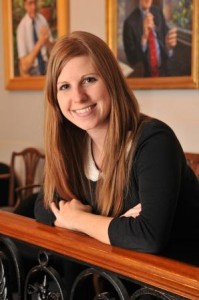Course studied: MSc Science, Communication and Society
Year of graduation: 2011
After graduating from my BSc (Kent) I got a job on a graduate programme as a sales executive for an orthopaedic company. However, there was a lot more to the role than just sales. I had to undertake an extensive training programme which involved learning how to do a hip, knee, ankle and ligament replacements so that I was able to advise the surgeons and nurses using our product how to use it whilst in theatre. This meant most days I was in scrubs in theatre assisting with surgery. When I wasn’t in theatre I was liaising with hospital staff, checking equipment, arranging transportation of stock, training theatre staff, attending surgeon conferences, attending surgeon training on cadavers or doing demos of kit in theatre waiting rooms. I covered the south east so I spent a lot of time driving round all of the hospitals in the region. Unfortunately, theatres generally don’t run to time so I also spent a lot of time waiting and drinking coffee in theatre staff rooms! After working here for 18 months I decided I wanted a career change so I returned to Kent to complete a Masters. On completing this I got a job as a Communications and Public Engagement Coordinator for The Royal College of Pathologists in London.
What is your current role?
I have recently been promoted and am now the Public Engagement Manager for The Royal College of Pathologists.
Describe a typical working day.
There isn’t really ever a typical day as the job is very varied – one of the best things about it! My days can involve attending public engagement events which we have organised, designing new resources for pathologists to use in schools, designing new event ideas, arranging and attending science communication training for pathologists, updating the website or social media, developing the public engagement strategy in line with budgets and publicising and judging public engagement competitions. I am also currently working with publications to produce a book which will be used for future public engagement activities.
What do you most enjoy about your job?
I love how different it is every day – I can be in the office cutting out organ shapes for a school activity one day and then in Newcastle hosting science communication training for pathologists the next! I get to collaborate with lots of other organisations in London, for example the Science Museum and NHS Blood and Transplant, I love meeting these different scientists and science communication teams and being inspired by the work they do. I am very passionate about communicating science so I love being able to do something where I feel like I am making a difference to the future of science.
How did your degree prepare you for the job you have now?
My Masters helps me every day in what I do. I am consistently referring back to many of the areas which we studied and applying the knowledge to the practical implementation of science communication within my field.
Do you have any particular memories of your time at the University and the degree programme?
The ‘Science on the Buses’ activity was definitely a highlight of my Masters degree. It gave us the opportunity to undertake some real science communication and potentially have an impact on the local community. The project involved being innovative and creative with our plans and it was exciting to know that these would be implemented for the general public to see. It was this activity which I feel really inspired me and confirmed my desire to work in the field.
Did you feel like an individual, not a number?
There was always a lot of individual support available. Lecturers were always willing to give up their time to help you if you asked for it and this helps to create a positive learning environment. There were only 15 of us on my Masters which meant there was even more time for one to one discussion and support as well as giving us the opportunity to tailor seminar discussions to our particular interests.
Do you have any advice for students interested in your career path?
Get involved in as much as you possibly can – employers will notice your enthusiasm for achieving if you have gone out of your way to learn new skills. A lot of skills are transferable to the work place so even if you don’t have much work experience, think of other ways you can enhance your CV. For example, volunteer at science festivals or get involved with your local Café Scientifique. I would also recommend keeping up to date with current topics, research, debates (and jobs!) in the field by joining the PSCI-COM mailing list available via JISC Mail.



Recent Comments